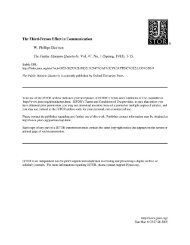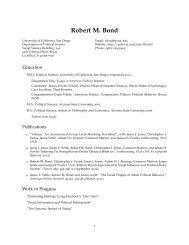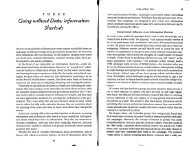Chapter 6 Why Authoritarian Parties? The Regime Party as an ...
Chapter 6 Why Authoritarian Parties? The Regime Party as an ...
Chapter 6 Why Authoritarian Parties? The Regime Party as an ...
Create successful ePaper yourself
Turn your PDF publications into a flip-book with our unique Google optimized e-Paper software.
CHAPTER 6<br />
have been administered by the Org<strong>an</strong>ization Department of the party’s Central Commit-<br />
tee <strong>an</strong>d contain positions within the party, the government, the military, state controlled<br />
enterprizes, <strong>an</strong>d other politically sensitive entities (e.g. universities, professional <strong>an</strong>d civic<br />
<strong>as</strong>sociations). Although the nomenklatura system probably represents the most systematic<br />
form of administrative formalization of benefits to party membership <strong>an</strong>d service, the precise<br />
content of nomenklatura lists <strong>an</strong>d criteria for promotion to a position on the lists have been<br />
rarely publicly stated. 10<br />
Whatarethepoliticalconsequences ofsuchhierarchical<strong>as</strong>signmentofservice<strong>an</strong>dbenefits<br />
within authoritari<strong>an</strong> parties? Before examining in detail the role of recruitment, promotion,<br />
<strong>an</strong>d retirement policies that shape this feature of authoritari<strong>an</strong> parties, consider a simple<br />
illustration of how hierarchical <strong>as</strong>signment of service <strong>an</strong>d benefits contributes to the survival<br />
of dictatorships. To keep this illustration <strong>as</strong> simple <strong>as</strong> possible, suppose that a dictator needs<br />
the active support of two citizens in order to stay in power. Consider first cooptation within<br />
the institutional structure of a regime party. To stay with the most rudimentary concept of<br />
a hierarchical party structure, suppose that the party apparatus consists of only two r<strong>an</strong>ks<br />
of membership, junior <strong>an</strong>d senior members. Juniors provide costly service for the regime<br />
at the individual cost c > 0, where<strong>as</strong> seniors enjoy the individual benefit b, b > c. For now,<br />
<strong>as</strong>sume that citizens live for two periods only; a junior automatically becomes a senior after<br />
one period of service <strong>an</strong>d all seniors retire after one period. <strong>The</strong>n, in <strong>an</strong>y period <strong>an</strong>d after<br />
accounting for the costly service that juniors provide, the dictator’s total net expenditures<br />
on the party are b−c.<br />
I will refer to cooptation without <strong>an</strong> authoritari<strong>an</strong> party <strong>as</strong> cooptation via tr<strong>an</strong>sfers.<br />
10 On the Soviet Union <strong>an</strong>d E<strong>as</strong>tern Europe, see Grzyma̷la-Busse (2002), Rigby (1988), <strong>an</strong>d Voslensky<br />
(1984); on China, see L<strong>an</strong>dry (2008) <strong>an</strong>d Shambaugh (2009); on Cuba see Domínguez (1978).<br />
13











